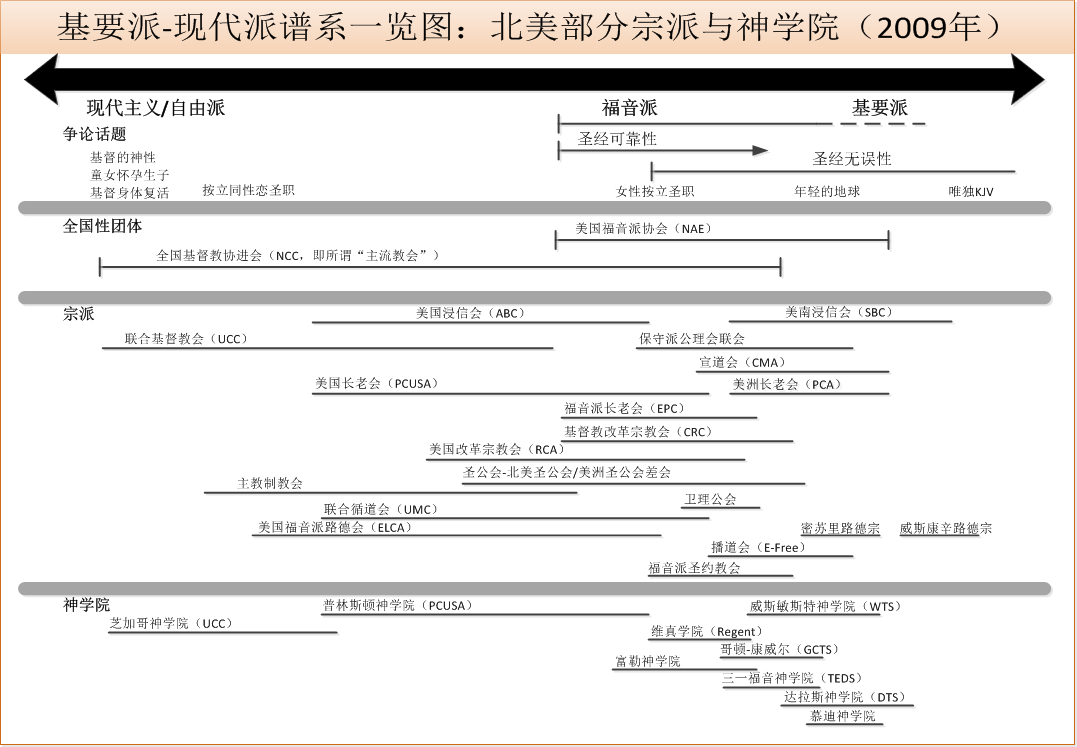North American Liberal Protestant-Evangelical Denominational Genealogy Chart,” provides a detailed explanation of some denominations and theological seminaries in North America.
From this chart, we can see that “Modernist/Liberal” and “Evangelical” and “Fundamentalist” are on completely opposite directions. The direction of denominational genealogy is indicated by a long arrow, with the liberal heading to the left, while the Evangelical and Fundamentalist heading to the right.
The main topics of contention for Modernist/Liberal include the divinity of Christ, the virgin birth, the bodily resurrection of Christ, and the ordination of homosexuals. Evangelicals debate the reliability of the Bible, while Fundamentalists dispute the inerrancy of the Bible. Due to these differences, controversies also arise in areas such as the ordination of women, the age of the earth, and the preference for the King James Version (KNV) Bible translation.
In terms of national organizations, the National Council of Churches (NCC) represents the Liberal Protestants, while the National Association of Evangelicals (NAE) represents Evangelicals and some Fundamentalists.
Purely Liberal denominations include the United Church of Christ (UCC) and the Episcopal Church. Denominations that span both liberal and evangelical theologies include the American Baptist Churches (ABC), the Presbyterian Church (U.S.A.) (PCUSA), the Reformed Church in America (RCA), the Episcopal Church (ACNA), the United Methodist Church (UMC), and the Evangelical Lutheran Church in America (ELCA).
Purely Evangelical denominations include the Conservative Congregational Christian Conference (CCCC), the Evangelical Presbyterian Church (EPC), the Christian Reformed Church (CRC), the Wesleyan Church, and the Brethren Church.
Denominations that span both Evangelical and Fundamentalist include the Southern Baptist Convention (SBC), the Christian and Missionary Alliance (CMA), the Presbyterian Church in America (PCA), and the Lutheran Church-Missouri Synod.
Purely Fundamentalist theological institutions include Wisconsin Lutheran Seminary.
Liberal theological seminaries include Chicago Theological Seminary (UCC), and seminaries spanning both liberal and evangelical include Princeton Theological Seminary (PCUSA). Evangelical theological seminaries include Westminster Theological Seminary (WTS), Gordon-Conwell Theological Seminary (GCTS), Fuller Theological Seminary, Trinity Evangelical Divinity School (TEDS), Dallas Theological Seminary (DTS), and Moody Theological Seminary.
This chart provides a convenient reference for understanding the distribution of theological denominations and seminaries in North America and can be helpful for theological research or individuals considering studying theology abroad.
Related Terms:
Liberalism:
For liberals, they distinguish the basic principles contained in the Bible from the scriptures themselves, believing that not all of the latter are necessarily factual. Many elements in the scriptures, which appear erroneous to modern individuals, have been denied by discoveries in contemporary science.
Liberals also engage in extensive reinterpretation of the content of the Bible. They attempt to transform the “revealed truth” in the Bible to align with natural and social realities based on current societal conditions and needs, as well as scientific discoveries. As a result, they believe that miracles such as the virgin birth and the resurrection after death should no longer be blindly believed. In an era of scientific progress, these supernatural elements have lost practical significance and no longer constitute the core of Christian faith. In their view, God is no longer a transcendent “perfect being” but a loving father among us, and His actions are consistent with natural laws and human rationality.
Regarding Christology, liberals emphasize the humanity of Christ rather than his divinity, and some even replace divinity with humanity.
Fundamentalism:
The term “fundamentalism” originated from a series of books written by believers in the Bible, aimed at providing detailed explanations of the doctrines upon which Christian faith is based. Completed by 64 authors between 1910 and 1915, these ninety articles were integrated into a series called “The Fundamentals.” With the support of wealthy Christians, tens of thousands of books were sent to Christian workers in the United States and twenty-one foreign countries. These articles assert the absolute correctness of the Bible, regeneration for salvation, divinity, virgin birth, miracles, the resurrection of Christ, and other truths. The books also point out errors in Catholicism, socialism, cults, and modernism.
Evangelicalism:
The term “evangelicalism” originated in the sixteenth century when religious reformers used this name to indicate their opposition to Roman Catholicism. Evangelicalism also refers to the spiritual movement that came with the Reformation.
Overall, evangelicalism adheres to traditional doctrines, emphasizes the authority of the Bible, and values scholarly research without being perceived as dogmatic or ignorant. Evangelicals position themselves as a “doctrinally emphasized denomination” and are more willing to consider various viewpoints compared to fundamentalism. For example, evangelicals collaborate with different churches but believe that church influence on political decisions and societal and scientific developments should be limited. Additionally, there are internal disagreements within evangelicalism regarding the ecumenical movement, but evangelical churches still actively participate.
